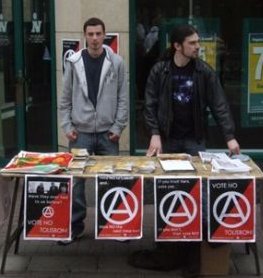Workers' Solidarity Movement campaign against the Lisbon treaty in Ireland
 Today Irish citizens are voting on whether to accept or reject the neo-liberal Lisbon treaty. They are alone among all the citizens of the EU states in being allowed a direct vote on the matter. Over the last weeks the Workers Solidarity Movement has been campaigning across Ireland for a No Vote. 50,000 leaflets have been distributed along with 2,000 posters on top of 20,000 issues of Workers Solidarity.
Today Irish citizens are voting on whether to accept or reject the neo-liberal Lisbon treaty. They are alone among all the citizens of the EU states in being allowed a direct vote on the matter. Over the last weeks the Workers Solidarity Movement has been campaigning across Ireland for a No Vote. 50,000 leaflets have been distributed along with 2,000 posters on top of 20,000 issues of Workers Solidarity.
Will the Lisbon Treaty vote change anything?
Last year, the EU Constitution was defeated in referenda in France and the Netherlands. Europe’s governments quickly got together and rewrote the constitution as an incredibly complicated list of amendments to existing treaties. Together these amendments make up the “Treaty of Lisbon.” Valery Giscard d’Estaing, the president of the Convention on the Future of Europe which did much of the ground work in drafting the constitution, has concluded that “the difference between the original Constitution and the present Lisbon Treaty is one of approach, rather than content”.
WSM Vote No campaign on Munster's streets - 17th May to 7th June
A photo-review of WSM activities in Munster cities during the Lisbon referendum
campaign. The Cork WSM branch, with the help of other comrades from Limerick and
Dublin, did 4 info stalls on the streets of Cork, Limerick and Waterford.
http://www.anarkismo.net/newswire.php?story_id=9126
Vote no to the Lisbon treaty
The Workers Solidarity Movement are printing and distributing 50,000 of the
following leaflets in our campaign for a 'No' vote on the referendum on the
Lisbon Treaty.
http://www.anarkismo.net/newswire.php?story_id=9085
Libertas: US Military Contractors Against Lisbon!
Irish citizens voted against the EU Nice treaty in June 2001 briefly throwing a
spanner into the works of the neoliberal EU agenda. The response was to force a
second vote accompanied by a lot of scare mongering the following year. Shortly
before the second referendum the pro-neoliberal media 'revealed' that the leader
of the right wing anti-treaty campaign had been present at far right meetings in
Germany, something that helped scare people into voting for the treaty second
time around.
http://www.anarkismo.net/newswire.php?story_id=9091
WSM say Vote no to Lisbon
Imagine that, leaving the pub on Saturday night, you find a fight outside. The
Gardai turn up, grab a load of people, including you, and drag you off to the
station, and throw in a beating in the back of the van. Next morning you are
taken to an interview room and an old garda gives you a cup of tea, apologises
for the “mix-up” earlier and says you can go as soon as you’ve signed a 6 page
statement he’s prepared for you.
http://www.anarkismo.net/newswire.php?story_id=9120
WSM Vote No campaign on Munster's streets - 17th May to 7th June
Limerick, Waterford, and Cork twice!
A photo-review of WSM activities in Munster cities during the Lisbon
referendum campaign. The Cork WSM branch, with the help of other comrades from
Limerick and Dublin, did 4 info stalls on the streets of Cork, Limerick and
Waterford as part of our campaign activities. Each was blessed with good sunny
weather and a public mood in some sympathy with our anarchist vote No message.
We gave out thousands of leaflets, and made new contacts across the cities. It
was also good to see what other campaigns were active on the ground across Munster.
When we did the Limerick stall almost a month ago, the mood among the public was
in the middle of forming, but all of us on that stall could feel that there was
a considerable No vote brewing out there. The ease of distributing leaflets was
evident as we got through over 600 that day, a pace that never faltered as we
moved from one city to the next. Thanks too due to our Limerick comrade Shane
who gave us a big hand that day and brought along a friend to help.
The Waterford experience continued in that positive vein, and there we met a
well-organised local No campaign comprised of the local left and republican
parties (SF, WP, SWP and 1 Eirigi were the folks we met) doing a No leaflet
distribution in the same square as ourselves! No matter, as there was room
enough for us all, and anyway there was a Labour party Yes group up the other
end of the square. I had a look at how the Yessers were getting on, and it was
clear by their demeanour they'd rather have been doing something other than
trying to distribute leaflets to an unheeding crowd. Boy, was I glad to see that!
The two Cork stalls happened in an atmosphere where you could surf the No-voting
mood if it was a wave; it was sheer pleasure (if a bit dehydrating in the urban
summer heat) to participate in those ones. We were delighted with the number of
leaflets we distributed in Cork, especially since the city's people would've
been heavily propagandised by us (lamp-post and letterbox) by the time we hit
Pana on the 31st. It wasn't all cherries as we had a few rude, awkward and a
couple of downright insulting customers come up to us, but these experiences
were far outnumbered by the positive vibes we were getting off many people. On
the day of the second Cork stall we were joined by SWP/PBPA and CAEUC in
distributing Vote No literature on Patrick St. We also managed to distribute
many papers, magazines and posters at our Cork stalls, and the final push from
our Dublin comrades on June 7th (who happened to be in town that day) topped off
what has been a month of prodigious activity in our Lisbon campaign.
***
Will the Lisbon Treaty vote change anything? by Chekov Feeney
Last year, the EU Constitution was defeated in referenda in France and the
Netherlands. Europe’s governments quickly got together and rewrote the
constitution as an incredibly complicated list of amendments to existing
treaties. Together these amendments make up the “Treaty of Lisbon.” Valery
Giscard d’Estaing, the president of the Convention on the Future of Europe which
did much of the ground work in drafting the constitution, has concluded that
“the difference between the original Constitution and the present Lisbon Treaty
is one of approach, rather than content”.
votenosmall.jpg
By redrafting the constitution as amendments to existing treaties, most of
Europe’s governments were able to avoid holding referendums and instead rely
upon the formality of parliamentary approval. Now, the only country to hold a
referendum will be Ireland.
The Lisbon treaty will give the EU the right to set policy in a broad range of
new areas. It will also redistribute voting and appointment rights among the
participating governments in a way that is more closely aligned to each
country’s population, effectively reducing the Irish government’s voice. It will
further remove each country’s veto over a range of policy areas.
By centralising more functions, and introducing slightly more balanced and
efficient decision making, the Lisbon Treaty represents another small step
towards a European Super-State. A large number of groups have expressed
opposition to the Lisbon treaty on the grounds that the emerging European state
erodes Ireland’s national sovereignty. While the treaty undoubtedly erodes the
Irish government’s sovereignty, it is a sovereignty freely surrendered. Not only
every government, but every single mainstream political party in the country has
supported every single European treaty.
Even those who began as fringe opponents of European integration, such as the
Green Party, became supporters as soon as they got a sniff of power. Similarly,
throughout Europe, governments of all stripes have repeatedly signed treaties
surrendering some of their sovereignty to the EU. If Europe’s governments really
represent the people, then European integration has their sovereign backing.
Europe’s democratic deficit does not lie between the sovereign governments and
the super-state; it lies between the people and their governments. The EU is an
arrangement between Europe’s business and political elite. They negotiate
treaties to their mutual satisfaction and nothing trifling like the people’s
opinions will be allowed get in their way.
When constitutional hindrances force them to have a referendum in some country
or other, and they somehow manage to lose, they simply repeat it until they get
the right answer, as happened in Ireland when the Treaty of Nice was rejected,
or else they redraft the agreements to avoid the vote altogether – as is now the
case with the Lisbon Treaty.
EU treaties, especially Lisbon, are long and complex, and popular knowledge of
the intricate workings of EU institutions is almost non-existent. Public debate
on the treaties has been singularly bad at informing the public about the
realities of the EU – with political leaders choosing to focus on emotive
appeals to high-minded ideals rather than the plans for the deregulation of
public services or any of the actual contents of treaties.
In such a context, the idea that Europe’s governments are expressing the
democratic will of their people becomes meaningless. In reality, from its
inception, the EU has been driven by Europe’s industrialists and their desire
for a large tariff-free “common market” for their products.
The Lisbon treaty shows their continuing imprint, with dozens of amendments
calling for further ‘liberalisation’ of markets in goods and services. This is
not to say that the European treaties are entirely devoid of social content. The
struggles and campaigns of workers throughout Europe have, over the years,
compelled Europe’s leaders to include a social component in their treaties.
Some of these social elements, such as health and safety and rights-based
legislation, have been helpful in workers’ campaigns for decent conditions in
backward regions such as Ireland. However, in general, the clauses about social
matters in EU treaties tend to be assertions of basic rights, at such a level of
abstraction that they have little beyond rhetorical value.
The EU treaties are still primarily a rulebook dictating how Europe’s
capitalists should act in their dealings with one another. The Workers
Solidarity Movement will be campaigning for a No vote in the Lisbon referendum.
However, we do not object to the loss of sovereignty that the treaty entails nor
do we worry about the Irish government having less voting rights.
We oppose the idea that Europe should be shaped by an unaccountable elite. We
reject the idea that Europe should be built as a hyper-competitive capitalist
market place. We oppose the attacks on public services implicit in the treaty’s
calls for liberalisation.
Most of all, we reject the arrogance and contempt that Europe’s ruling class
shows for the masses, in claiming popular support for their alliances through
referenda which serve only as sad caricatures of democratic decision making.
However, while a big No vote might indicate that a large number of people are
opposed to the arrogance of our political elite, by itself it means little.
The Irish government and EU will figure out a way to get around it. In the long
run, in order to oppose the power of Europe’s capitalist elite, Europe’s people
need to organise themselves internationally, through trade unions, political
groups and other voluntary organisations. We must provide alternative visions of
Europe’s future. At the same time as opposing our current leaders, we must try
to build a new Europe from below – a genuinely democratic Europe based on
socialism, mutual aid and international solidarity.
From Workers Solidarity 102
First published on Irish indymedia
Pictures at: http://www.anarkismo.net/newswire.php?story_id=9126
_________________________________________






